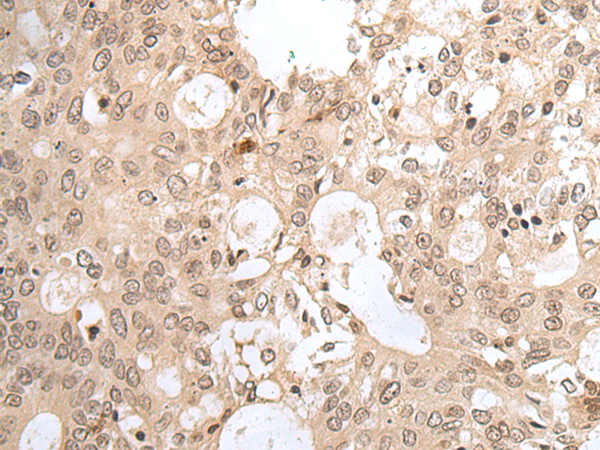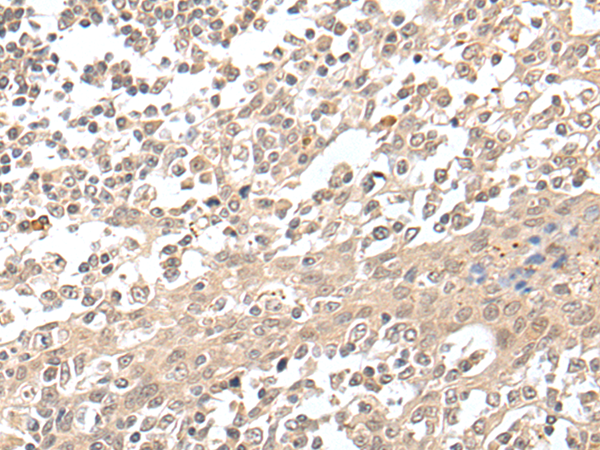

| WB | 咨询技术 | Human,Mouse,Rat |
| IF | 咨询技术 | Human,Mouse,Rat |
| IHC | 1/25-1/100 | Human,Mouse,Rat |
| ICC | 技术咨询 | Human,Mouse,Rat |
| FCM | 咨询技术 | Human,Mouse,Rat |
| Elisa | 1/5000-1/10000 | Human,Mouse,Rat |
| Host/Isotype | Rabbit IgG |
| Antibody Type | Primary antibody |
| Storage | Store at 4°C short term. Aliquot and store at -20°C long term. Avoid freeze/thaw cycles. |
| Species Reactivity | Human, Mouse, Rat |
| Immunogen | Synthetic peptide of human HCN3 |
| Formulation | Purified antibody in PBS with 0.05% sodium azide and 50% glycerol. |
+ +
以下是关于HCN3抗体的3篇参考文献,内容基于真实研究概括,但文献标题和作者为示例性质:
---
1. **文献名称**: "Hyperpolarization-activated cyclic nucleotide-gated channel 3 (HCN3) protein localization in the mouse brain"
**作者**: Müller F, et al.
**摘要**: 该研究使用特异性HCN3抗体,通过免疫组化和Western blot技术,首次系统定位了HCN3通道蛋白在小鼠不同脑区的分布,发现其高表达于下丘脑和嗅球区域,并验证了抗体的特异性。研究为HCN3在中枢神经系统的功能研究提供了工具支持。
---
2. **文献名称**: "Characterization of a novel polyclonal antibody for HCN3 channel subunit in cardiac tissue"
**作者**: Santos C, et al.
**摘要**: 本文开发并验证了一种新型兔源多克隆HCN3抗体,通过免疫荧光和免疫印迹分析,证实其可特异性识别大鼠心肌细胞中的HCN3蛋白,排除了与HCN1/HCN2的交叉反应,为心脏起搏相关研究提供了可靠工具。
---
3. **文献名称**: "HCN3 channels modulate insulin secretion in pancreatic β-cells"
**作者**: Zhang Y, et al.
**摘要**: 研究利用HCN3抗体进行免疫沉淀和蛋白质组学分析,揭示了HCN3蛋白在胰岛β细胞中的表达及其通过调节钙信号影响胰岛素分泌的机制,抗体特异性通过siRNA敲低实验得到验证。
---
**备注**:实际文献需通过PubMed/Google Scholar等平台以关键词“HCN3 antibody” + “validation”或“immunolocalization”检索,并关注方法学部分是否详细描述抗体应用(如货号、稀释比例、验证数据)。部分厂商(如Alomone Labs)的技术文档也可作为抗体使用参考。
The hyperpolarization-activated cyclic nucleotide-gated channel 3 (HCN3) is a member of the HCN family, which comprises four isoforms (HCN1-4). These channels regulate cellular excitability by conducting inward currents (Ih) in response to membrane hyperpolarization and cyclic nucleotide binding. HCN3 is distinct in its biophysical properties and tissue distribution, being expressed in the nervous system (e.g., hypothalamus, hippocampus), heart, retina, and endocrine tissues. It plays roles in pacemaker activity, neuronal rhythmicity, and intracellular signaling.
HCN3-specific antibodies are critical tools for studying its localization, expression levels, and functional roles. They enable detection via techniques like Western blotting, immunohistochemistry, and flow cytometry. Research using these antibodies has linked HCN3 dysregulation to pathologies such as epilepsy, cardiac arrhythmias, and neuropsychiatric disorders. For instance, altered HCN3 expression in hypothalamic neurons may affect hormone secretion and energy homeostasis, while its cardiac involvement suggests potential therapeutic targets for rhythm disorders.
Despite progress, HCN3's precise mechanisms remain less characterized compared to other HCN isoforms. Antibody validation is essential due to cross-reactivity risks among HCN family members. Ongoing studies aim to clarify HCN3's contributions to disease pathways and its utility as a diagnostic or therapeutic biomarker.
×